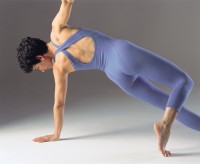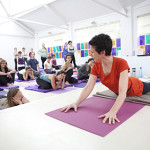I first discovered Donna Farhi in my local library in Queenstown. Her book Yoga Mind, Body and Spirit: A Return to Wholeness was liberating, informative and challenging.
She taught not asana by asana, this body part in that body place, but through universal principles that underlay every asana. It was a watershed moment in my Yoga journey as my home practice had begun to diverge from anything resembling a standard hatha class.
With Donna’s book within easy reach, I felt able to honour the practice that was evolving from my inner teacher while understanding it with the intellect as well. Her understandings also helped shift my teaching from merely directing students into asana to instead encouraging them to explore and breathe their way into their bodies.
So you can understand my excitement when I heard she was coming to Dunedin to deliver a one-day workshop on July 3rd. What a fantastic opportunity to study with a world-renowned Yoga teacher! Plus it also gave me an opportunity to finally interview Donna for The Yoga Lunchbox 🙂 .
Here’s what she had to say:
You travel extensively to teach, what motivates you to stay on the road? Are you finding more opportunities to teach in New Zealand as Yoga grows in this country?
The passionate commitment and enthusiasm of my senior students is a strong motivational factor in continuing to travel. I have very strong support from senior students in London, Manchester, Dublin, Beijing, Helsinki, Amsterdam, Germany, all the major cities in Australia as well as key cities within the United States. These students want my support in seeding a more organic and feminine approach to Yoga that is also scientifically sound.
Although I love teaching beginners I no longer teach regular public classes because I feel that the best use of my energy is training teachers and also devoting time to writing projects and archiving knowledge. Also for those senior students who have done my 21-day advanced studies program, my continued regular presence in their cities allows me to offer ongoing mentorship such as sitting in on their classes and giving in-depth feedback about how to improve their teaching.
Like anyone, I also have to support myself and my 30 acre farm, and much of my discretionary income is now being devoted to native restoration projects on my land.
All of that said, I have a strong desire to spend less time on the road and more time at home!
I am slowly teaching more in New Zealand and will be offering one 25-hour Spinal Integration intensive in Christchurch this June, and two intensives next year (one weekend intensive in February and one 25 hour intensive later in the year).
My goal is to build a stronger sangha or sense of community and support between Yoga practitioners here in the South Island. I’ve seen this develop in Auckland where I teach regularly: teachers helping each other in the spirit of friendship rather than competition.
As part of the intention to build a strong Yoga community I will be sponsoring other teachers who have special skills to come to Christchurch. For instance, Libbie Nelson, who is a practicing physiotherapist, acupuncturist and highly trained Yoga teacher will be coming to lead three clinical intensives in Christchurch next year. My goal is to give teachers in the South Island more opportunities to build their knowledge of working with specific conditions such as back pain, neck and shoulder disorders and conditions such as anxiety and depression which are unfortunately very common here in New Zealand.
This workshop focuses on the breathing body, how important is breath and pranayama in Yoga?
Breathing is the first human developmental movement pattern. Without a functionally integrated full body breathing pattern you are really building your house on quicksand. The word pranayama can be broken down into its root words pra which means “consistency” in the na or “life force”, and yama means “to harness”. I see pranayama has a fundamentally natural process of returning to the native equilibrium of the breath rather than a forced control of the breath.
Some yogic traditions work from an understanding that before pranayama can be learned, asana must first be mastered. Yet so few will master asana in their lifetime – does this teaching still hold true for yoga in a Western context?
If you are talking about classical pranayama practices that involve deliberate alteration of the breathing process I would agree, but I don’t define pranayama in this way. Therefore the idea that you perfect asana before practicing pranayama is absurd to me. Breathing IS the most basic movement that a human being makes and it is the basis for all other movement.
If you were to make an uncompromising commitment to inquire into the fullest expression of your breath in every movement and within every asana, the inquiry itself would lead you to impeccable alignment because that is the only place where the channels for breath are completely open. Alignment is nothing more than the clearest pathway of impulse through a structure.
I find it rarely works the other way round because people have such arbitrary and conditioned ideas about ‘what the pose is supposed to look like.’ Unfortunately these concepts are often not founded in correct understanding of anatomy or kinesiology and we end up working against the structure instead of with the structure. If you could make yourself a servant to the breath and become receptive rather than directive in your attitude you will learn a great deal.
If nothing else, what’s the one thing you always hope students leave your workshops with?
Reclaiming their own inner reference system, which in this tradition is known as the inner atman or teacher. And more important than that is forming a loyal allegiance to that inner teacher so you can act in a way where your mind, body and emotions are in a collective agreement with your actions.
Anything else you’d like to add?
Remember that this practice that we call Yoga is for us to use to serve our dharma in this life time. We should adapt the practice to meet our needs so that it remains relevant and useful within the context of our everyday lives.
We are not sacrificial victims to the postures.
When you understand that the Yoga is for you and you are not for the Yoga, you can begin to reclaim your place within the evolution of the practice itself.
Donna Farhi Dunedin Workshop ‘The Breathing Body’
Date & Venue: Saturday, July 3, 9.30 – 12.30pm & 2.00 – 4.00pm @ Burns Hall, First Church, Dunedin
Cost: $95
Contact: Gemma Carroll, Hereweka Yoga & Massage
E-mail: gemmacarroll@clear.net.nz
Phone: (03) 478-0313
Cellphone: 021-031-3482
For full details, please download this registration flyer.
Buy one of Donna Farhi’s yoga books, including:
Help support The Yoga Lunchbox – use a link above to buy any of the above books from Fishpond and The Yoga Lunchbox receives an affiliate commission.


Hurrah – thanks Kara-Leah! I too cherish Donna’s books. I’m excited to be coming down from Wellies to Donna’s Spinal Integration in ChCh. 🙂
Hey Lisa,
Awesome – enjoy the Spinal Integration Clinic!
Hugs from Dunedin 🙂
KL
Hurrah, thanks KL 🙂 Big hugs to you too! I love your avatar…super cute.
x, L